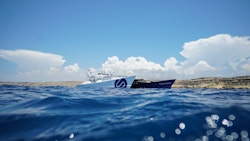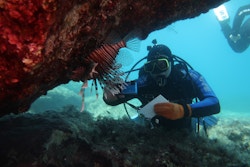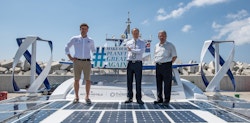Limassol, Cyprus
Energy Observer’s stopover in Cyprus was dedicated to biodiversity and was the 17th official stop on the vessel’s world tour.
Coming from: Israel, Tel Aviv
Time of arrival: 6:00 AM

Energy Observer in Cyprus
For several years now, Cyprus, like other countries in the Mediterranean, has been suffering the first consequences of climate change and human activities, with a particular impact on ecosystems and biodiversity. Initiatives devoted to study and protection have emerged, and the crew, led by Victorien Erussard and Jérôme Delafosse, went to see them.
The Cypriot economy is dominated by the service sector, in particular tourism, transport and finance. Urbanization, increased tourism and infrastructure such as highways and buildings have led to a fragmentation of natural areas and the loss of natural habitats. The effects of global warming that can already be felt further exacerbate the problems Cypriots face. The island’s biodiversity, one of the richest in the Mediterranean region, faces many pressures caused not only by human activities but also by the arrival of new species, which is facilitated by changing terrestrial and underwater climate conditions.
Originally from the Indo-Pacific region, lionfish appeared in Cyprus in 2012, and their growing population in the Mediterranean is worrying scientists, fishermen, and divers. The crew met with marine biologist Louis Hadjaiannou, head of the Elania Physis research center, and his team, who are studying these fish to determine their impact on the marine ecosystem and gain a better understanding of the population in order to implement containment strategies. The “exponential” increase of lionfish in the region can be explained by higher temperatures and the fact that the Suez Canal, which was widened in 2015, facilitates their arrival in Mediterranean waters. Invasive species are among the five primary causes of global biodiversity loss, according to the International Union for Conservation of Nature (IUCN).

Diving with lion fish
Meeting the turtles and their defenders
Volunteers and researchers have been working tirelessly for over 30 years to protect and save two species of turtle indigenous to the island: the green turtle and the loggerhead turtle. Accompanied by Julia Haywood, a doctoral student at the University of Exeter, and volunteers from SPOT association (Society for the Protection of Turtles), the team got the chance to see one of these giants of the seas laying eggs. Faced with numerous threats such as illegal capture, plastic pollution, urbanization and mass tourism, marine turtles have unfortunately become an endangered species and a veritable symbol of the fight to protect biodiversity in the Mediterranean region. Scientific studies and efforts to protect nesting sites allow for a better understanding of these direct descendants of the dinosaurs so that we can better protect them and especially preserve their habitat.

🌊#EOnews🌊 On #worldoceansday, and all throughout our #odyssey, we realize the impacts #mankind has on the #oceans and #sealife because of #plastic #pollution. In #Cyprus, we witnessed the autopsy of a #turtle that had so much plastic in its throat, and #beaches filled with pieces of plastic life you could grab a handful easily. We need to act #now to fight #plastic pollution and save our oceans by phasing our plastic from our lives
The stopover was also a good opportunity to meeth with His Excellency Mr René Troccaz , French Ambassador in Cyprus, who exchanged with the crew, discover the vessel, how it works and its mission.

Marin Jarry and His Excellency Mr René Troccaz , French Ambassador in Cyprus
Energy Observer arrived in Rhodes on June 6th, first Greek island of its journey towards the Greek capital city.